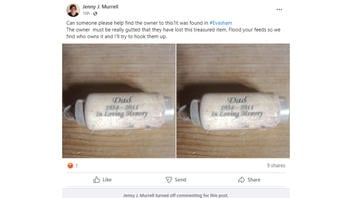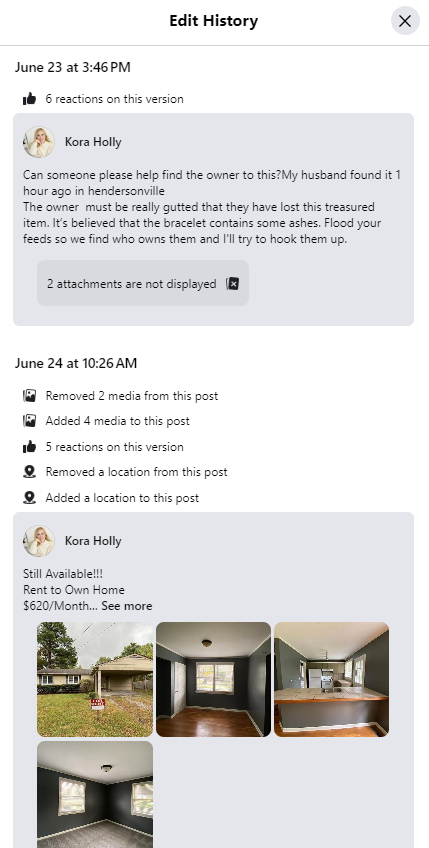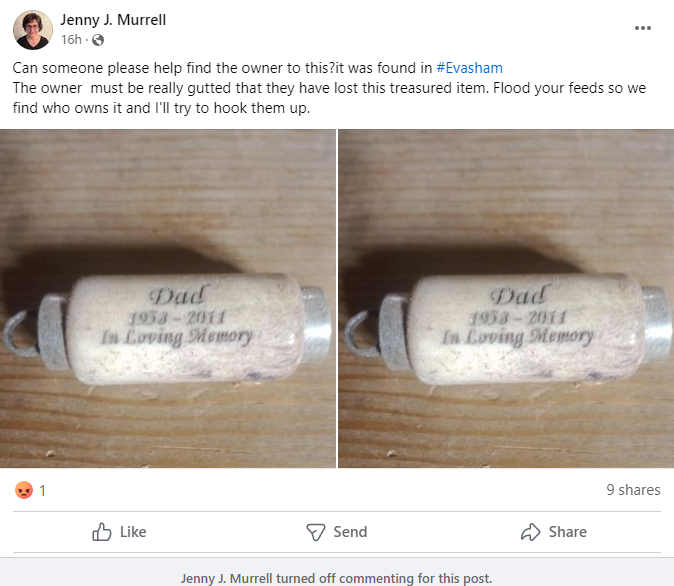
Is there an identical "treasured item" being found in multiple locations at the same time? No, that's not true: The social media posts that describe this alleged loss are bait-and-switch posts. These posts use made-up stories to garner engagement. Once they get enough, the posters switch the content to advertise real estate.
The claim appeared in a post (the post was edited to feature real estate content at the time of writing) on Facebook on June 26, 2024. The post, made in the Items For Sale In Evesham And Surrounding Areas group on Facebook, included two pictures of a small trinket that memorialized someone's father. Evesham is located in England. The text of the post read:
Can someone please help find the owner to this?it was found in #Evasham
The owner must be really gutted that they have lost this treasured item. Flood your feeds so we find who owns it and I'll try to hook them up.
This is what the post originally looked like on Facebook at the time of writing:
(Source: Facebook screenshot taken on Thu Jun 27 14:19:41 2024 UTC)
The 'treasured item' post
The post making the claim is not the only one that has used this same scenario to seek out online engagement. A post (archived here) made in the Hendersonville community yard sale group on Facebook on June 23, 2024, previously had the same caption (aside from the different named location). However, the content was edited from notifying those around Hendersonville, North Carolina, about a "treasured item" to one about a "Rent to Own Home." These changes can be found by utilizing the feature "View edit history." Screenshots of the changes are included below:

(Source: Facebook screenshot taken on Thu Jun 27 14:41:58 2024 UTC)

(Source: Facebook screenshot taken on Thu Jun 27 14:43:20 2024 UTC)
Real estate scam posts
Real estate scam posts are a tactic used on Facebook by spammers that employ a "bait and switch" content to lure people into a scam. A post's creator will pair an alarming or heart-wrenching claim with a compelling image to catch people's attention -- missing children or aging adults, injured animals, injured people in hospital beds and sex trafficking tactics -- and thereby drive engagement.
Once a post has garnered sufficient attention, the content switches to push a deceptive real estate advertisement. The wording and images of these eye-catching posts, typically seen on local Facebook "yard sale" pages," are frequently identical, even when the offered property is located in different cities, regions of the U.S. or other countries.
The content switch is clearly documented by a post's edit history, which also notes additions or deletions of content. In some instances time stamps on the posts indicate when the switches were made but on some posts, timestamps don't change even though the content does.
Commonly, such posts use links that lead to landing pages with disclaimers or false promises and contact information requests that can be used to gather personal data, including financial information, from people who follow the trails.
Some links purport to connect people to a U.S. Housing and Urban Development site to help them search for deals on foreclosed homes. Lead Stories found the links lead to new sites that carry disclosures at the bottom of the page that note they are "not affiliated with, endorsed, authorized, or approved by the Federal Government or the US Department of Housing and Urban Development."
Other Lead Stories debunks of claims involving bait-and-switch posts are here.


















